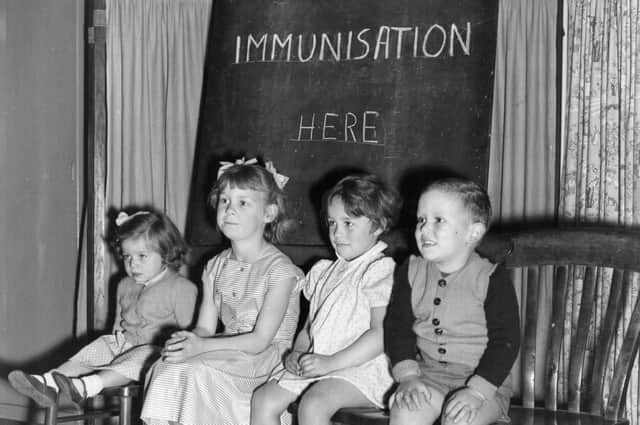Long Covid and post polio syndrome: The lessons to be learned from the polio pandemic's lasting effects – Peter Jones


It started in the UK in the early to mid 1950s with the Salk vaccine in 1956 and the Sabin vaccine six years later in 1962. The vaccination programme continues today in many countries of the world, with the USA and UK using only the inactivated polio vaccine since 2000 and 2004 respectively.
It has been suggested that Covid might be described as this generation’s polio and there are some comparisons between the two viral infections and the associated pandemics.
Advertisement
Hide AdAdvertisement
Hide AdThe condition that was named and identified as polio in 1847 had been known since Egyptian times. The first time the condition of polio was recorded in the medical literature is thought to be 1789. Polio was also known as infantile paralysis as it mainly affected young children.
Covid, however, appeared to be a new disease, possibly a form of something like pneumonia, but was of special concern to public health experts in that it appeared in many countries in a very short space of time, was highly infectious and could rapidly lead to the need for treatment in intensive care, and in some cases death.
During the polio pandemic of the late 1940s and early 1950s, the effects were similarly devastating in that children who appeared to be quite fit and healthy in the morning could be dead by the evening if the virus severely affected their respiratory muscles. For many others the subsequent effects could last a life time.
Indeed there are many physicians and physiotherapists alive today who can still remember wards full of children and adults in iron lungs, with patients requiring them for many years and without which they were not able to breathe.
Even for those who survived the initial infection, a large number were left with problems that included crippling deformities, decreased mobility, and perhaps a life necessitating the use of a wheelchair, or reliance on cumbersome calipers. In other words, the disease could have life-changing consequences.
For those survivors who were more fortunate and able to lead a virtually normal life, perhaps with some restrictions on their physical mobility, over time they have started to experience the symptoms of long-term polio, or post-polio syndrome, of which it is estimated that there are still in the order of 50,000 such people in the UK.
The main symptoms are persistent fatigue, extreme tiredness, muscle weakness, shrinking muscles, muscle and joint pain, breathing problems including sleep apnoea, swallowing difficulties and greater sensitivity to cold.
It is very easy to think of polio as something that is “done and dusted” but the detection of the polio virus in the sewers in parts of London, and in New York, reminds us that these life-threatening diseases are still lingering in the background and also emphasises the value of effective vaccines and vaccination programmes to protect the population. The same is also true for Covid where the vaccines produced, and which are still being developed and enhanced, have substantially reduced the risk of being seriously ill or dying.
Advertisement
Hide AdAdvertisement
Hide AdLong Covid has only been with us for a relatively short time and its debilitating effects have been well publicised. Long polio – post-polio syndrome – has been with us for more than half a century, also having a profound effect on those who survived the initial infection, yet it has received very little publicity and recognition by some sectors of the healthcare professions in the UK, especially compared with countries such as the USA, Australia, Canada and some parts of mainland Europe.
It is very much hoped that the research programmes investigating long Covid and its successful management will also be of benefit to post-polio syndrome patients.
As a polio sufferer myself, I know all too well how important it is that diseases such as this one and, more recently, Covid are taken seriously and that the necessary investment, support and research is provided to ensure that many others are not harmed in the future.
Despite the considerable and impressive research that has resulted from investigating Covid, there is much still to be learnt, especially in relation to new variants emerging as the virus mutates.
There is also a great need for investment into the causes and treatment of some of the long-term effects, especially chronic fatigue, that is a significant feature not only of long Covid and long polio, but also other conditions such as myalgic encephalomyelitis (ME) and multiple sclerosis (MS). A breakthrough in this area would be a major advance with benefits to many people.
Much of the success in dealing with the Covid pandemic was due to close collaboration amongst scientists from a wide cross section of specialities all over the world. Such collaboration and engagement with both governments and the population at large is necessary to help curtail the spread of this still dangerous health condition.
There is much we can and must learn from the polio epidemic of over 50 years ago if we are all to enjoy a healthier and safer society and prevent debilitating and life-changing conditions such as long polio and long Covid from diminishing or destroying the lives of our fellow citizens.
Peter Jones is vice-chair of the Scottish Post Polio Network, which aims to ensure all polio survivors in Scotland have access to appropriate health and social care, and the support to maintain independence and live their lives in dignity
Comments
Want to join the conversation? Please or to comment on this article.